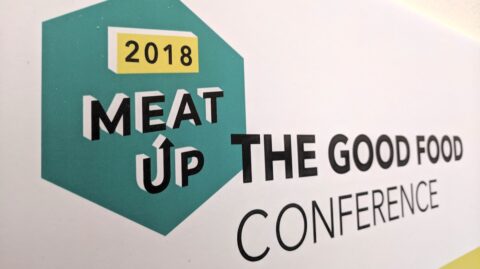News
GLP-1 Users Lose Weight, and Their Taste for Meat
Research•3 min read
Reported
The Good Food Conference in Berkeley, organized by the industry powerhouse Good Food Institute, gathered hundreds of entrepreneurs, scientists, investors, media and other industry people into the packed two-day event.


Words by Jonathan Carey
A panel of a few key leaders and innovators in the clean meat industry spoke at the Good Food Conference about where the technology is heading and how to overcome the inevitable obstacles ahead to make clean meat mainstream.
The clean meat industry has been steadily growing over the past five years. A report released this year by Markets and Markets expects the global market to be worth around $15 million by 2021. These findings go in conjunction with a growing willingness of consumers to try cultured meat. A recent study conducted by Faunalytics, a nonprofit research organization found that of close to 1,200 consumers – after learning what clean meat is and its benefits – 66.4% said they would be willing to try the product.
That’s awesome news for Josh Tetrick (CEO, Just), Uma Valenti (CEO, Memphis Meats), Lou Cooperhouse (CEO, BlueNalu), Niya Gupta (CEO, Fork & Goode) who all spoke to the crowd at Berkeley University. However, with this growing desire and our unsustainable appetite for meat protein, new challenges are facing the industry at every turn.
Two major roadblocks the panel addressed most in-depth were lowering the cost of clean meat while scaling the industry, and how to break through the culture of eating meat. “You have to recognize it is part of our cultural lives,” said Tetrick. He explained that he doesn’t expect the world to shift from eating conventional meat to clean meat, but that the way to capture consumers is through their taste buds and wallets. Regardless of a person’s convictions or feelings about animal welfare or the environment, if you provide consumers with a product that costs the same as a pack of steaks, that tastes better, and is healthier to boot, consumers will eventually choose what’s inevitably better for their lives.
Reaching this stage of production and product understanding goes hand-in-hand with driving cost down and scale up. Making one pound of Memphis Meats today costs roughly $2,400 because of the culture-based growing process used to create the meat. That means seeing clean meat on the shelves of every Wal-mart in the next two years is highly unlikely, but creating partnerships with other industries to help create clean meat and working together as an industry are crucial strategies for bringing costs down with a higher output of product, said Uma Valenti.
The Good Food Conference in Berkeley, organized by the industry powerhouse Good Food Institute, gathered hundreds of entrepreneurs, scientists, investors, media and other industry people into the packed two-day event.